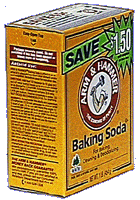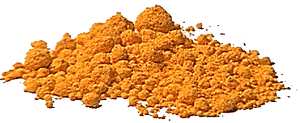
A pure substance can be either an element or a compound. Elements are those pure substances that cannot be decomposed by ordinary chemical means such as heating, electrolysis, or reaction. Gold, silver, and oxygen are examples of elements. Compounds are pure substances formed by the combination of elements; they can be decomposed by ordinary chemical means.Baking soda is a compound; it contains the elements sodium, hydrogen, carbon, and oxygen, and it decomposes on heating.

Mercury(II) oxide is another compound; it contains the elements mercury and
oxygen, and on heating it decomposes to those elements.
 |
|
Mercury(II) Oxide
|
Compounds differ from mixtures in that the elements in a compound are held together by chemical bonds and cannot be separated by differences in their physical properties. The components of a mixture are not joined together by any chemical bonds, and they can be separated from one another by differences in their physical properties.
Figure 3.1 reviews the relations between different kinds of matter. Notice that mixtures can be separated into their components by differences in physical properties. Compounds can be separated into their components only by chemical change.
| FIGURE 3.1 The differences between the various kinds of matter. |